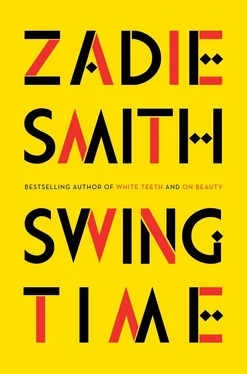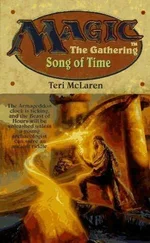Lily’s mother reappeared. We piled into a long, blue car, which had several rows of seats, like a little bus, and when these seats had been filled, Tracey, me and two other girls were told to sit in the space at the back, in the boot, which was lined with a filthy tartan rug covered in dog hair. My mother had given me a five-pound note in case either of us was expected to pay for anything, and I was anxious about losing it: I kept taking it out of my coat pocket, flattening it against my knee and then folding it up into quarters again. Tracey meanwhile was entertaining the other two girls by showing them what we usually did when we sat in the back of the school bus that took us, once a week, up to Paddington Rec for PE: she got up on her knees — as far as the space allowed — placed two fingers in a V sign either side of her mouth, and thrust her tongue in and out at the mortified male driver in the car behind. When we stopped, five minutes later, on Willesden Lane, I was thankful that the journey was over but disheartened at the destination. I’d imagined we were heading to one of the grand cinemas in the center of town, but we were parked in front of our own little local Odeon, just off the Kilburn High Road. Tracey was pleased: this was home territory. While Lily’s mother was distracted at the ticket booth Tracey showed everyone how to steal pick-and-mix without paying for it, and then, once we were in the dark theater, how to sit balanced on a flipped-up seat so that nobody behind you could see the screen, how to kick the seat in front of you until the person turned round. “That’s enough, now,” Lily’s mother kept mumbling, but she couldn’t establish any authority, her own sense of embarrassment seemed to stop her. She did not want us to make noise, but at the same time she couldn’t bear to make the necessary noise it would take to stop us making noise, and as soon as Tracey had understood this — and understood, too, that Lily’s mother had no intention of smacking her or swearing at her or dragging her out of the cinema by her ear as our mothers would have done — well, then she felt herself to be quite free. She kept up her commentary throughout, ridiculing the plot and the songs and describing the many ways the narrative would violently diverge from both Kipling’s and Disney’s vision if she herself were in the place of any or all of the characters. “If I was that snake I’d just open my jaw and yam that fool up in one bite!” or “If I was that monkey I’d kill that boy soon as he turned up in my place!” The other party guests were thrilled by these interventions, and I laughed the loudest.
Afterward, in the car, Lily’s mother tried to start a civilized conversation about the merits of the movie. A few girls said nice things, and then Tracey, again sitting in the very back — I had disloyally moved to the second row — piped up.
“Whassisname — Mowgli? He looks like Kurshed, don’t he? In our class. Don’t he?”
“Yeah, he does,” I called back. “He looks just like this boy Kurshed in our class.”
Lily’s mother took an exaggerated interest, she turned her head right round as we paused at a traffic light.
“Perhaps his parents are from India.”
“Nah,” said Tracey casually, looking away, out of the window. “Kurshed’s a Paki.”
We drove back to the house in silence.
• • •
There was cake, though it was poorly decorated and homemade, and we sang “Happy Birthday,” but then we still had half an hour before our parents were to pick us up and Lily’s mother, not having planned for this, looked worried and asked what we’d like to do. Through the kitchen doors I could see a long, green space, overgrown with vines and bushes, and I longed to go out there, but this was ruled out: too cold. “Why don’t you all run upstairs and explore — have an adventure?” I could see how struck Tracey was by this. Adults told us to “stay out of trouble” and to “go and find something to do” or “go and make yourself useful” but we were not accustomed to being told — instructed! — to have an adventure. It was a sentence from a different world. Lily — always gracious, always friendly, always kind — took all her guests to her room and showed us her toys, old and new, whatever we fancied, without any sign of bad temper or possessiveness. Even I, who had been to her house only once before, managed to feel more possessive about Lily’s things than Lily herself. I went around showing Tracey the many delights of Lily’s room as if they were my own, regulating how long she could hold this or that item, explaining to her the provenance of the things on the walls. I showed her the huge Swatch watch — and told her that she mustn’t touch it — and pointed out a poster advertising a bullfight, purchased while the Binghams were on a recent holiday in Spain; under the image of the matador, instead of the matador’s name, was printed, in huge, curlicue red letters: Lily Bingham . I wanted Tracey to be as amazed by this as I had been the first time I saw it but instead she shrugged, turned from me and said to Lily: “Got a player? We’ll put on a show.”
Tracey was very good at imaginative games, better than me, and the game she preferred to all others was “Putting on a Show.” We played it often, always with just the two of us, but now she began to enlist these half-dozen girls in “our” game: one was sent downstairs to get the gift-wrapped single that would be our soundtrack, others were put to work making tickets for the upcoming show, and then a poster to advertise it, others collected pillows and cushions from various rooms to use as seats, and Tracey showed them where to clear an area for the “stage.” The show was to be in Lily’s teenage brother’s room, where the record player was kept. He wasn’t home and we treated his room as if we had a natural right to it. But when almost everything was organized Tracey abruptly informed her workers that the show would, after all, feature only her and me — everyone else was to be in the audience. When some of the girls dared to question this policy Tracey in turn questioned them aggressively. Did they go to dance class? Had they any gold medals? As many as she? A few of the girls began to cry. Tracey changed her tune, a little: so-and-so could do “lighting,” so-and-so could do “props” and “costumes” or introduce the performance, and Lily Bingham could film it all on her father’s camcorder. Tracey spoke to them as if they were babies and I was surprised how quickly they were mollified. They took their silly made-up jobs and seemed happy. Then everyone was banished to Lily’s room while we “rehearsed.” It was at this moment that I was shown the “costumes”: two lacy camisoles taken from Mrs. Bingham’s underwear drawer. Before I could speak Tracey was pulling my dress up over my head.
“You wear the red one,” she said.
We put the record on, we rehearsed. I knew there was something wrong, that it wasn’t like any dance we’d done before, but I felt it was out of my hands. Tracey was, as ever, the choreographer: my only job was to dance as well as I could. When she decided we were ready our audience was invited back into Lily’s brother’s room to sit upon the floor. Lily stood at the back, the heavy recorder on her narrow, pink shoulder, her pale blue eyes full of confusion — even before we had begun to dance — at the sight of two girls dressed in these slinky items of her mother’s that of course she had probably never seen before in her life. She pressed the button that said “Record,” and by doing so put in motion a chain of cause and effect which, more than a quarter of a century later, has come to feel like fate, would be almost impossible not to consider as fate, but which — whatever you think of fate — can certainly and rationally be said to have had one practical consequence: there’s no need for me now to describe the dance itself. But there were things not captured by the camera. As we reached the final chorus — the moment where I am astride Tracey, on that chair — this was also the moment that Lily Bingham’s mother, who had come upstairs to tell us so-and-so’s mother had arrived, opened her son’s bedroom door and saw us. That is why the footage stops as abruptly as it does. She froze at the threshold, still as Lot’s wife. Then she exploded. Tore us apart, stripped us of our costumes, told our audience to return to Lily’s room and stood over us silently as we got back into our stupid dresses. I kept apologizing. Tracey, who normally had nothing but backchat for furious adults, said nothing at all, but she packed contempt into every gesture, she even managed to put her tights on sarcastically. The doorbell rang again. Lily Bingham’s mother went downstairs. We did not know whether to follow. For the next fifteen minutes, as the doorbell rang and rang, we stayed where we were. I did nothing, I just stood there, but Tracey with typical resourcefulness did three things. She took the VHS tape out of the recorder, put the single back in its sleeve and put both items in the pink silk drawstring purse her mother had seen fit to hang on her shoulder.
Читать дальше












